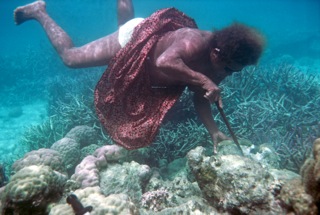Adi and its Potential for Gassroots Alata Management
Subsistence shelling along the mangrove shores of Fanalei island and the Passage is uncontrolled by adi. Mangroves have always been left open for women and girls foraging edible shellfish. They collect three prime edible types of oysters and clams that grow around prop roots. Lau women trade these shellfish with bush women for root crops, such as yams and taro.
 The introduction of dive goggles circa 1925, allowed people to see and harvest effectively and efficiently underwater. The introduction of goggle technology by coincidence corresponded with the pre-WWII international market demand for pearl shell buttons, bringing Chinese and German buyers into the Solomons. Lau in Port Adam Passage, unlike their northern Lau relatives, were motivated by cash to switch to imposing adi for the marketable pearl shells, ending adi for net-fishing.
The introduction of dive goggles circa 1925, allowed people to see and harvest effectively and efficiently underwater. The introduction of goggle technology by coincidence corresponded with the pre-WWII international market demand for pearl shell buttons, bringing Chinese and German buyers into the Solomons. Lau in Port Adam Passage, unlike their northern Lau relatives, were motivated by cash to switch to imposing adi for the marketable pearl shells, ending adi for net-fishing.
The Fanalei chief as steward of the alata still calls for pearl shell adi to build up stocks and reserve rights to this cash commodity. Unlike fish, pearl shells are non-perishable and simple to stockpile for sale. Anyone, whether they come from the chiefly clan or not, can ask the chief to let them be an adi-maker. Either sex can be an adi-maker since both saltwater men and women can forage.
To begin the ban, the adi-maker places a stick out on the reef and tells everyone which specific shells and other marine life are included in this adi, and declares how long the ban will last. But because of the introduction of waterproof flashlights for night diving, adi poaching has increased and become a problem.
When the adi is over, the adi-maker announces the opening day of harvest. If the adi-maker is not from the alata owner's clan, he can accompany the adi-maker on this first day as a form of compensation payment. Anyone else who wishes a share, donates two days of labor to the adi-maker, with the third day's harvest as payment. There are always some divers who collect less diligently in order to have more to harvest for themselves at the end.
Fanalei’s transition into intensive weekly net-fishing has been in line with village practices since their adi for net-fishing ended before WWII. This has left alata reef fish without any stock recuperation/ conservation bans. If Fanalei's alata owner were to reintroduce the adi for cash net-fishing, villagers might easily reincorporate the cultural logic of their adi.








